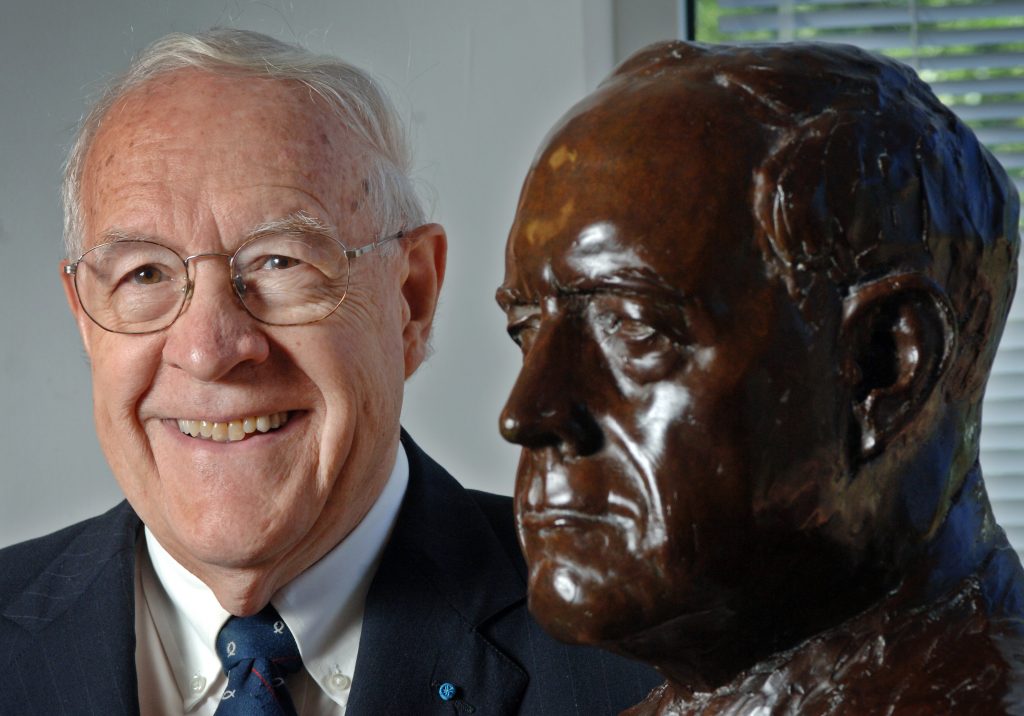
The pain was particularly intense when she swam the breaststroke. “My legs would bend back and my kneecaps would bang against the cartilage,” Alicia Mullis said. “That’s not supposed to happen. The cap should fit in a nice little groove, but my kneecaps are a little off center.”
For years Mullis endured chronic pain, some days even struggling to walk. But it was never bad enough to make her stop swimming. As her high school athletic career went on, Mullis did specific exercises to strengthen the knee tendons so that the caps would be more centered.
At Carolina, the pain had become more manageable – nothing an ice pack couldn’t handle.
A recipient of the Dunlevie Honors Undergraduate Research Award, Mullis conducted her own research and wrote an undergraduate thesis on chronic pain.
Looking back, Mullis, who graduated earlier this month, thinks something beyond modern sports medicine helped her cope with her faulty knees – playing music.
Musical evolution
Mullis has played the piano since she was 7 and the clarinet since she was 11.
“I considered majoring in music,” Mullis said. “But it’s such a competitive field, and I felt I had other options.” She settled on psychology and biology – with a minor in Arabic – and then joined the lab of psychologist Mark Hollins.
At first Mullis didn’t think playing music had anything to do with relieving her own chronic pain. She just wanted to do research that would have real-life implications for others.
But during a course on evolutionary psychology, a few short textbook passages piqued her interest in why humans started playing musical instruments. “It’s a phenomenon that evolutionary psychologists can’t explain,” she said.
Mullis thought that maybe music had functioned as a kind of pain modulator for humans living tens of thousands of years ago. That is, playing music somehow helped the brain cope with pain.
She devised a project to test her hypothesis. Mullis recruited 41 UNC students and used a standard survey to sort participants by whether they had chronic pain and whether they played music. She gave each participant two cognitive tests: a letter-counting task and a number-prediction task.
Researchers in the past had used similar methods to show that chronic pain sufferers struggle with cognitive tasks. And clinical observations showed the same thing, Mullis said. Fibromyalgia patients, for instance, often say they feel like they’re in a fog; their brains don’t function as well as other people’s brains.
After crunching her data, Mullis found that people who have chronic pain and play music at least once a week did substantially better on cognitive tasks than people who have chronic pain but don’t play music.
Her results also showed that people without chronic pain who play music didn’t do any better on the cognitive tasks than people without chronic pain who don’t play music. The findings suggest that music had a protective effect against chronic pain.
The number-prediction task, which involves making decisions, was such a good predictor of musicians maintaining cognitive skills that Mullis hopes the test can be turned into a diagnostic tool.
“It’s really hard sometimes to differentiate between acute and chronic pain,” she said. “Those patients need to be treated differently; a new tool would be enormously helpful to the field.”
The brain on music
Mullis said that music as a pain alleviator doesn’t work like a pill or an ice pack.
When her knee would flare up after swimming laps, she wouldn’t towel off and start playing the clarinet to soothe her ailing knee. Instead, the theory goes, playing music for years helped Mullis’ brain cope with pain and not focus on it.
Whenever a person experiences the same pain stimulus over and over, neurons in the brain fire in consistent ways, day after day for months or even years. That much is fact. What that does to cognition is unclear, but Mullis said that those consistent neural responses may train the brain to process specific pain stimuli at the expense of other impulses.
The result would be loss of cognitive ability, which is what those cognition tests predicted.
“Think about it like a neural rut,” she said. “Interactions between the brain and body become more linear.”
Brain activity becomes simplified and focused, something called decomplexification, and it can lead to problems including lower pain thresholds, sensitivity to light and touch, and emotional sensitivity. Patients say they can’t help but focus on the pain.
Music, Mullis said, might serve as a kind of countermeasure, a recomplexifier.
“Brain imaging studies have shown that when people play music, their brains just light up,” Mullis said. Many parts of the brain are involved, because playing music is about complex patterns interacting.
That’s the way the brain functions, until chronic pain takes hold. Music may help the ruts from getting too deep, Mullis said, which helps people avoid the worst that can result from chronic pain – such as a diminished capacity to make decisions or even depression. And that could explain why chronic pain never got the best of her.
“I don’t know if my data say as much about recomplexification as about music being effective for people with chronic pain,” Mullis said. “But it’s an interesting idea that’s worth looking into.”
Mullis might do just that in graduate school. But first she wants to publish her thesis and work for at least a year before choosing a doctoral program.
“I want to make sure I choose the right one,” she said.
[Editor’s note: This story by Mark Derewicz appeared on Endeavors’ Web site and later in the University Gazette.]



